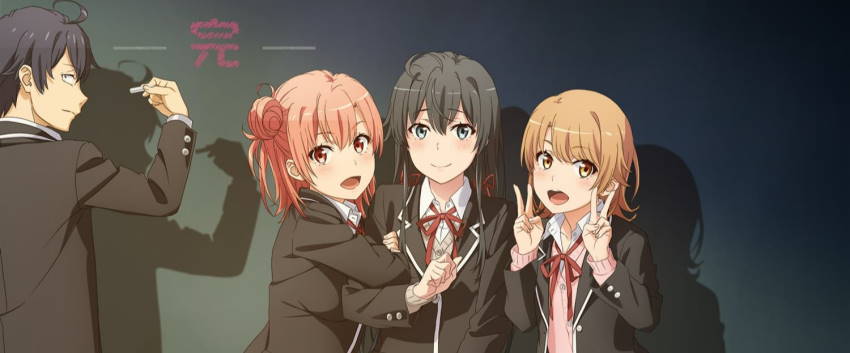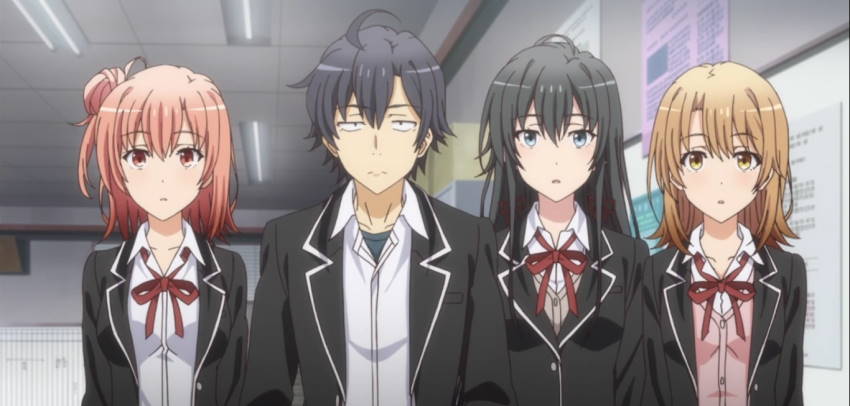I Recommend My Teen Romantic Comedy SNAFU

I would have never given My Teen Romantic Comedy SNAFU a single glance had my brother not been watching it. Even if the title were the more accurate translation of My Youth Romantic Comedy is Wrong As I Expected, it would carry with it assumptions and expectations that would drive me away.
It’s not an eversion to romance as a genre, either. If anything, my favorite fictional romances and romantic tales tend to come from Japanese media. Be it the original live-action Shall We Dance? – a story which fits broader definitions or the word “romantic” rather than the more common and restricted perspective – or the meaningful relationship highs and lows of Hikaru Ichijyo in Super Dimension Fortress Macross, I find the the amorous developments in anime, role-playing games, and film to focus more on each character’s complementary personalities and the trials of navigating the maze of emotional vulnerability. Most other romance comes off as some cheap wish-fulfillment escapism whose conflict is generated through contrivance and blatant foolishness.
Over the past twenty years, however, the nature of Japanese Otaku have changed, and therefore the nature of romance in anime has shifted. Amorous comedies have more often felt shallow and empty, such as Gamers!. The show is certainly entertaining, but the love… square? serves no greater purpose than to deliver punchlines through constant and convenient misunderstandings. There is no deeper study into why these misunderstandings happen and what impact they have on the protagonists finding contentment in their relationships. Just as the title of My Youth Romantic Comedy is Wrong as I Expected – from here on referred to as its Japanese shorthand Oregairu – the romantic comedy in Gamers! goes wrong as any viewer might expect and predict.
Despite its title, Oregairu is not as predictable or contrived. It certainly is not a shallow, feel-good, escapist comedy of errors like Gamers! Everything is wrong as the protagonist expects because he himself is broken, wounded, and building a defensive barrier against the confusing and hostile experience of high school society. The show isn’t a romantic comedy, It is a thorough examination of human psychology, emotional vulnerability, and social structures.
Protagonist Hachiman Hikigaya is an intelligent yet emotionally wounded fifteen year-old. His confessions of love to various young girls in his middle school years have left him cynical not just of romance, but human relationships in general. He has developed the ability to see past everyone’s facade, though at the cost to his own self-esteem. He intentionally acts in a manner that will cause everyone to dislike him so that he does not risk being hurt. You never risk emotional vulnerability and pain if you assume rejection in the first place.
This personality acts as Hachiman’s strength and weakness. His fear of being hurt – and therefore his own facade – causes him to misinterpret the actions of those that would be closest to him. A perfect example is in the first half of the opening season, when he completely misunderstands Yui Yuigahama’s reasons for being nice to him.
This is one of the most memorable monologues of the show due to how strongly it hits home for many of its viewers. However, it is not intended to be a statement of truth by the author. This monologue occurs after he tells Yui that she does not need to feel obligated to be nice to him just because he got hurt saving her dog from getting run over. It is his assumption that she’d only be so kind out of obligation.
What this speech reveals about him is that he does not even allow himself to consider the possibility that his saving her dog caused her to see his kindness; to look past his facade and catch a glimpse of who he really is. Hachiman instead chooses to interpret Yui’s kindness as an obligation because to do otherwise invites the possibility of getting his hopes up. If he gets his hopes up then he allows himself to be vulnerable, and therefore hurt, just as he had so many times in the past.
There is truth in his speech, in that a young man trying to navigate the emotional turmoil of young love, hormones, and attraction is bound to misread kindness as affection and therefore inflate his heart with hope. It is easy to become cynical, frustrated, and to develop a sense of pessimism and distrust so that you can protect yourself.
Hachiman is not the only character that has done this.
Yukino Yukinoshita is a young woman from a wealthy family whose combination of beauty, status, and intelligence have led her to be ostracized by many of her peers growing up. Any man that had romantic interest in her was largely due to her status or beauty rather than her personality. She, too, has constructed a defensive barrier around herself due to social hardships. She is just as capable of recognizing the false smiles and superficial attitudes of those around her as Hachiman is.

At its heart, Oregairu is about Hachiman and Yukino overcoming their fear of pain and learning to be honest with themselves about themselves. This is accomplished by orchestrating scenarios where our protagonists cut right through the facade and address the real problem.
The irony, however, is that it often requires Hachiman to throw himself under the bus. To accept his status as being despicable in the eyes of the social elite and adept in order to orchestrate change where everyone else can still save face.
Only the first season is truly characterized in this manner. By the second season he has come to address his true feelings. The reality of such growth, however, is that it only reveals new conflicts in development.
At the time of this writing there are still two episodes left of the series that I have not seen. I have no clue how it will end. I cannot see this show ending on any note but bittersweet. The only question is just how bitter?
I feel that the show has raised an interesting question, though: is it possible to have close relationships without a facade? Perhaps one day I’ll be able to write about the show with far more depth, devoting an entire essay into each of the major characters. There’s certainly a lot that can be said of every character’s relationship not just to Hachiman, but to one another.
Which is why I recommend Oregairu, localized as My Teen Romantic Comedy SNAFU. It is not light-hearted escapism, and those seeking a typical romantic comedy are not likely to find it. You may even strongly dislike Hachiman Hikigaya at first. Yet it is an intelligent story about wounded characters doing their best to love themselves and to allow themselves to be loved.
No matter how this show ends, I’ll undoubtedly watch it many more times over throughout my life.


